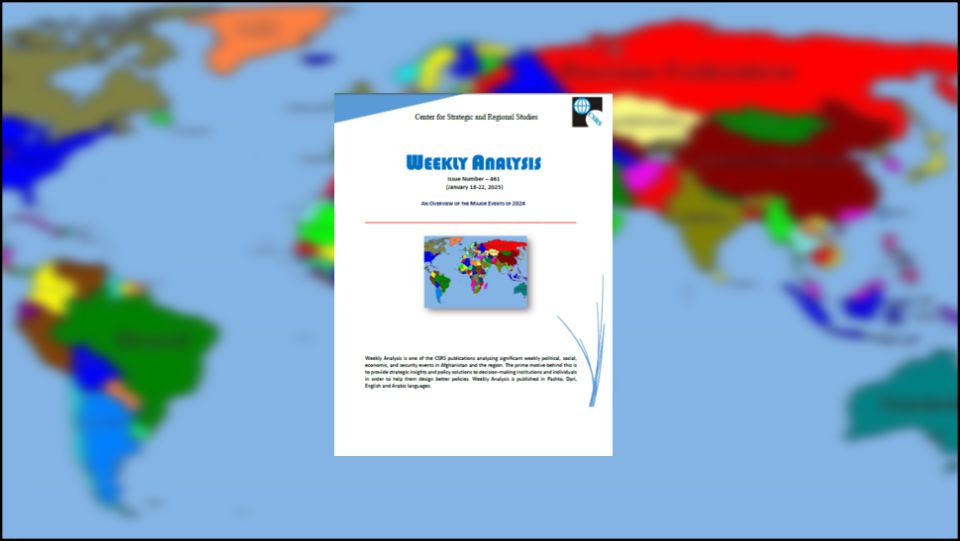By: Center for Strategic & Regional Studies
Note: Click here for the PDF file of this analysis.
___________________________________________________________________
In this issue:
- An Overview of the Major Events of 2024
- Section One: The World in 2024
- Section Two: Afghanistan in 2024
- Conclusion
- References
- ______________________________________________
Introduction
Introduction The year 2024 has ended, marking a period filled with significant events. This year can be considered one of the most impactful in recent history, with numerous political, security, and military developments shaping global dynamics. These events have not only influenced the course of 2024 but will also play a critical role in shaping trends and policies in 2025 and beyond. This article aims to provide an analytical review of the major global events in 2024 in the first section. The second section will focus on the most notable developments in Afghanistan during the same year.Section One: The World in 2024
- Global Political Events
- Global Security and Military Events
section two: Afghanistan in 2024
- Political Events
- Security and Military Events
- Afghanistan’s Economy in 2024
Conclusion
The analysis of global and Afghan developments in 2024 reveals a year filled with significant political, security, and economic events. Politically, the year witnessed substantial leadership transitions in many countries, with over seventy nations experiencing changes in government. Among these, the shift of power in the United States from Democrats to Republicans, particularly the return of the controversial figure Donald Trump, is likely to have a profound impact on global politics in the years ahead. One remarkable observation about global political changes in 2024 is that except for Syria—where a forceful regime change occurred but was viewed as a positive development—all other transitions took place through democratic mechanisms. This highlights the continued presence of democratic norms in global governance. However, in contrast to the political landscape, the year was marked by numerous and dramatic security and military events. The Middle East crisis reached new heights, with direct military confrontations between Iran and Israel. The war between Russia and Ukraine persisted without any clear resolution in sight. These ongoing global security crises reveal the inability of international institutions, particularly the United Nations, to resolve such conflicts peacefully. This situation paints a troubling picture of instability and unpredictability in the international system. In Afghanistan, 2024 was a year of political stability but with notable security challenges. Despite the Islamic Emirate maintaining nationwide security, ISIS continued to pose a serious threat, carrying out attacks, including a suicide bombing that claimed the life of a cabinet minister. In the realm of international relations, 2024 was a productive year for Afghanistan. The frequent visits of high-ranking officials from various countries to Kabul indicated growing regional acceptance of the Islamic Emirate as a legitimate government. Economically, Afghanistan achieved significant progress. Foreign trade flourished, and the country attracted considerable investments. The Islamic Emirate also made notable efforts in infrastructure development, particularly in repairing and constructing major roads, such as the Salang Highway. In summary, 2024 was a dynamic year. While the global political scene highlighted the resilience of democratic processes, persistent security crises underscored the challenges faced by international institutions in maintaining peace. For Afghanistan, the year brought political stability, increased international engagement, and notable economic advancements, despite ongoing security concerns.References:
- Lessons from the elections in 70 countries in 2024 – AP, 30/12/2024, available at: AP News
- Shehbaz Sharif elected as Pakistan’s Prime Minister from PML-N – AVA News, 02/03/2024, available at: AVA Press
- Modi declares victory in Indian elections – BBC Persian, 24/05/2024, available at: BBC Persian
- Putin wins Russian presidential elections; EU condemns – BBC Persian, 17/03/2024, available at: BBC Persian
- Labour Party wins UK parliamentary elections – Anadolu News, 27/06/2024, available at: Anadolu Agency
- Helicopter crash investigation of President under review – Mehr News, 20/05/2024, available at: Mehr News
- Terrorist attack in Russia leaves 143 dead, ISIS claims responsibility – Mashregh News, 25/03/2024, available at: Mashregh News
- How did Hezbollah obtain pagers that exploded in Lebanon? – Al Jazeera, 18/09/2024, available at: Al Jazeera
- Taliban Ministry of Commerce announces Turkmenistan and Kazakhstan officials’ visit to Kabul – Afghanistan International, 23/04/2024, available at: Afintl
- Russian delegation’s visit to Kabul marks a new phase in relations – IRNA, 27/11/2024, available at: IRNA
- Strengthening ties between Kabul and Beijing: Chinese representative’s visit to Afghanistan – Tolo News, 29/11/2024, available at: Tolo News
- Senior Tajik security official visits Kabul, meets Taliban intelligence leaders – Ufuq News, 10/06/2024, available at: Ufuq News
- Indian delegation in Kabul discusses economic development and visa facilitation – Tolo News, 06/08/2024, available at: Tolo News
- Russia nears removing Taliban from banned groups list – DW, 11/12/2024, available at: DW
- Doha’s third meeting: Afghanistan’s war and peace has no single winner or loser – BBC Persian, 15/06/2024, available at: BBC Persian
- Taliban Minister Khalil-ur-Rahman Haqqani killed in Kabul explosion – BBC Persian, 11/12/2024, available at: BBC Persian
- Border clashes between Afghanistan and Pakistan: 19 Pakistani soldiers killed – Anadolu News, 18/12/2024, available at: Anadolu Agency
- Afghanistan’s GDP increased by 2.7% in 2024 – Salam Watandar, 31/12/2024, available at: Salam Watandar
- Afghanistan’s trade volume in 2024 surpassed $12 billion – VOA Dari, 26/12/2024, available at: VOA Dari
- Afghanistan attracted $5.3 billion in investments in 2024 – Government Daily, 19/12/2024, available at: Afghan Dailies
An Overview of the Major Events of 2024

